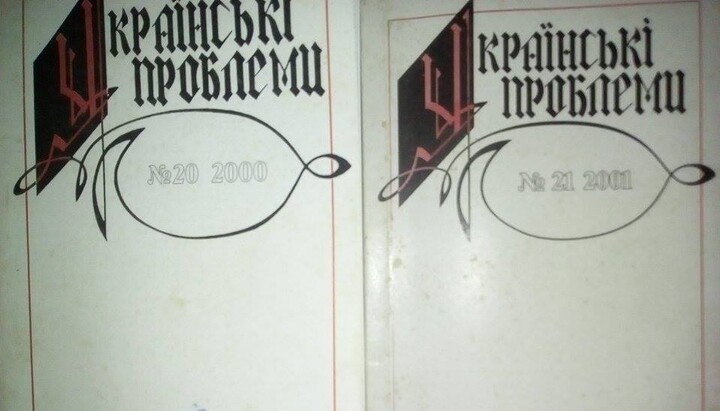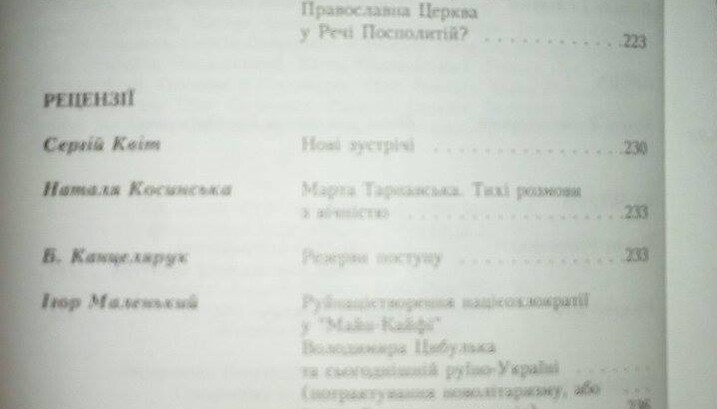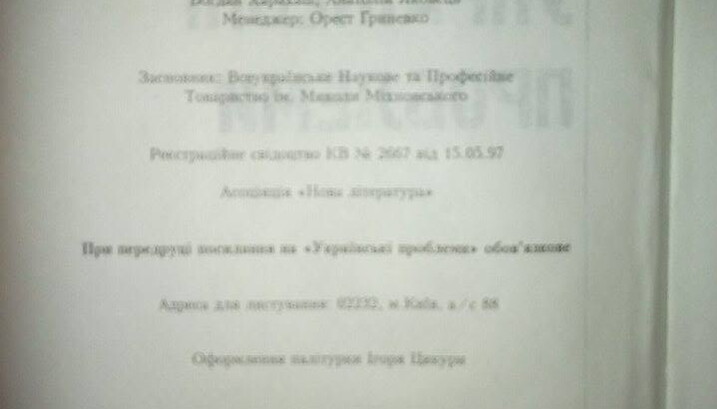How Taras Shevchenko is turned into a Catholic
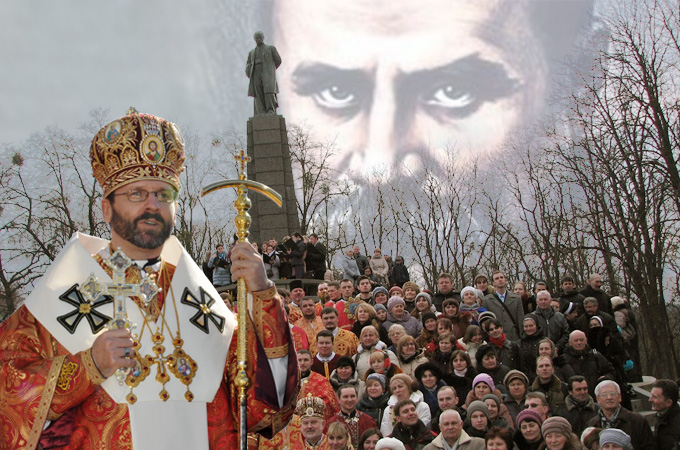
No, this is not an outline of the plot of an alternative history book, it is the harsh and ruthless "reality" of modern Ukraine. If you did not know what postmodern is, now you are aware of it. Postmodern is when everything is possible. Even what you considered impossible.
A pattern interrupt and cognitive dissonance. It is difficult to comment on the news that the head of the Uniates together with his flock and officials of the Ministry of Culture will make a "pilgrimage" to the Taras Hill to perform a funeral service for the repose of Taras Grigorievich's soul and "all those who died for the freedom of Ukraine." After that, they will join the planting of young oaks in the framework of the action "Seeds of Unity".
The outstanding Ukrainian poet could have hardly assumed that those whom he mercilessly exposed in his works and considered the greatest misfortune of the Ukrainian people would pray for the repose of his soul.
«Ще як були ми козаками,
А унії не чуть було,
Отам-то весело жилось!
… Аж поки іменем Христа
Прийшли ксьондзи і запалили
Наш тихий рай. І розлили
Широке море сльоз і крові,
А сирот іменем Христовим
Замордували, розп’яли.
Поникли голови козачі,
Неначе стоптана трава.
Украйна плаче, стогне-плаче!
За головою голова
Додолу пада. Кат лютує,
А ксьондз скаженим язиком
Кричить: “Te deum! алілуя!»
(Orsk Fortress — 1850, Orenburg)
It is a historical fact that the works by Taras Shevchenko were once prohibited in the Vatican by the "Papal index", along with the works by Nicholas Copernicus, Galileo Galilei, Giordano Bruno, Voltaire, Descartes, Rousseau, Rabelais, Daniel Defoe. Later in Rome, Shevchenko's "Kobzar" was even publicly burned.
It would seem impossible to connect the unconnected. However, the Greek Catholics managed to do this. Without repentance for the process of Catholicization in the 15-17 centuries, without remorse for defeating three Orthodox dioceses in Western Ukraine in the early 90s. The pilgrimage to Shevchenko’s grave could be accompanied by some words of regret about the mentioned things. Taras Grigorievich, looking from heaven, would appreciate this. But nothing of the sort. Neither a shadow of regret, nor a word of remorse. Exclusively triumphalism and pathos statements about unity. Unity is obviously on the basis of the idea of the union (unia).
Further on, the Greek Catholics will begin to talk about the responsibility of the Orthodox for all the misfortunes of Ukraine. Do you think this is impossible? They have been talking about this for a long time. This process is not spontaneous, but systematic and well-paid. A revolution in historical self-consciousness does not occur immediately – it is secured by measured work, undermining traditional historical concepts.
This is the journal "Ukrainian Problems", with the title printed in Gothic font on its cover, for 2000 and 2001. Let's pay attention to its sponsors (Uniate Radio "Sunday") and the editor-in-chief – Sergey Kvit, the future Minister of Education of Ukraine.
It features a very interesting article entitled "Was the Orthodox Church Persecuted in Rzeczpospolita?" In it, a Polish historian backed up the assumption that there were no persecutions against the Orthodox Church, and all this was invented by the Moscow Church. According to the Polish historian, in the conflict between the Poles (Uniates) and the Orthodox Ukrainians, the Ukrainians were to blame. They say, there appeared Cossacks who began to muddy the water and searched for enemies. So, innocent Uniates happened to be in the wrong place at the wrong time: "The Cossacks, as a new social stratum, who needed self-affirmation and broader class rights, and thus needed an adversary, tried to let out their great emotion / hatred, and Uniathism and Catholicism became the target."
A moment of silence. Such a blatant distortion of historical facts and the transformation of the victim of violence into the aggressor is striking. Further, there is one more revelation: "Ukrainians are used to considering their history as a complete oppression of them, but in fact in the 18th century they were an offensive factor, the Polish authorities were afraid of them and took preventive and protective steps." That is, Ukrainians terrorized peaceful Poles, and the latter only defended themselves.
In the article by the Uniat archbishop (since 2001 the head of the UGCC) Lubomir Husar under the promising title "Desire for unity and love" the Orthodox will not find remorse for the defeat of the Orthodox dioceses in the 90s. On the contrary, Huzar firmly denies any guilt and facts of violence on the part of Greek Catholics. This is the "desire for unity". Therefore, when the Uniates the day after tomorrow plant the "seeds of unity" on the Taras Hill, it is necessary to clearly understand what kind of "unity" and "love" they have in mind.
The authors of the journal also paid great attention to the work of Taras Shevchenko. The editor-in-chief (Greek-Catholic) Sergey Kvit gives a review of the book by the Uniate Vasil Ivanishin "Unread Shevchenko." Ivanishin is the founder and leader of the all-Ukrainian organization Trizub (Trident) named after Stepan Bandera (Dmitry Yarosh’s "spiritual father"), the author of the book "The Ukrainian Church and the process of national revival", dedicated to the revival of the UGCC and the glorification of the Unia.
Here are several theses from his book: it is the Orthodox who are to blame for the division between the Orthodox and Catholics; one of the reasons for the Union of Brest was the creation of the Moscow Patriarchate and the split of the one Russian church (that is, the North Russian population betrayed the South Russians); in general, the reason for the unia was that the Ukrainians needed to save their identity under an aggressive onslaught on the part of Poland. The aссeption of the unia made life easier for people (however, it does not explain what this has to do with religious motivation). Violence in enforcing the unia was par of the course, they say, Christianity in Russia was also enforced with "fire and sword". Orthodox hierarchy in Ukraine revived by Hetman Sahaidachny was a "step back" (that is, the Orthodox are to blame for the division of a single Ukrainian people)!
Ivanishin argues not as a believer, but as a nationalist, for whom the nation and national culture are superior to God and purely religious beliefs. Everything religious is placed in the concept of "rite," which, in his opinion, confines the problem of the clash between Orthodoxy and Catholicism. The Church for him is only an instrument for the political self-affirmation of the nation.
Uniates have been attempting to "appropriate" Shevchenko in the context of rewriting the history for a long time, since they realized how huge is the anti-Uniate potential of his works. Therefore, Greek Catholics somehow could not get around this issue. Every Ukrainian knows what Shevchenko is, reads his poems, coming across Catholic executioners, spiteful Jesuits, insidious Uniates. Well, what a nuisance!
So the "writers" and "professors" began to forge the image of the "new" Shevchenko and his work. In the notorious journal, then a postgraduate student of the Institute of Journalism of Taras Shevchenko University Lina Vezhel published an article with the subtitle "Taras Shevchenko through the prism of Gavriil Kostelnik." It is in 1946 when Kostelnik advocated for the unification with the Orthodox Church. But in 1910, when his "analytical work" entitled "Shevchenko from the religious and aesthetic position" was published in the journal "Niva", he was still a committed Uniate. We definitely will not find any analysis of Shevchenko's anti-Uniate motives in the work by Kostelnik. Instead, there is much pathos about how Taras Grigorievich hated "moskals". The author also described how he was influenced by the book of the Catholic theologian Thomas a Kempis. A little more – and we’ll meet Сryptocatholic Taras Shevchenko.
Analyzing the other articles of the journal, it is not difficult to see that it is completely built on anti-Orthodox positions and the desire to rewrite history in favour of the UGCC. Rewriting history in their favour is one of the tasks of modern Greek Catholics and Catholics. Without discrediting Orthodoxy, this task cannot be fulfilled. In their historical concepts, they in every way emphasize the flawed nature of Orthodoxy, its fallacy as a civilizational choice for Ukraine.
The Ukrainian Roman Catholic writer Valery Shevchuk writes in his book "The Cossack State": "I believe that if Ukraine had adopted Christianity not of the Eastern but of the Western faith, that is Roman Catholic, back in the time of Vladimir, or at least of King Daniel of Galicia, we would have fewer problems today and live as a people firmly incorporated in the European context, which means that we would be at a higher level in civilizational development than we actually are, because the Roman Catholic faith has contributed to the development of literature, culture, education , science and art more than the Eastern Catholic."
The Orthodox world, from their point of view, is antidemocratic, closed, anti-Western, of little culture, etc. In the same journal "Ukrainian Problems", one of the authors in the article "Lessons of the Yugoslav War" states the following: "The countries of the Catholic cultural and civilizational tradition (Slovenia, Croatia) demonstrated their spiritual and social superiority in comparison with the peoples of the Orthodox and Islamic traditions", etc. And the mentioned Polish historian claims that there was no Catholicization, because "everything Catholic was perceived as the highest European style of life, therefore, it tempted primarily the aristocracy and the gentry, who actively moved into the Latin faith."
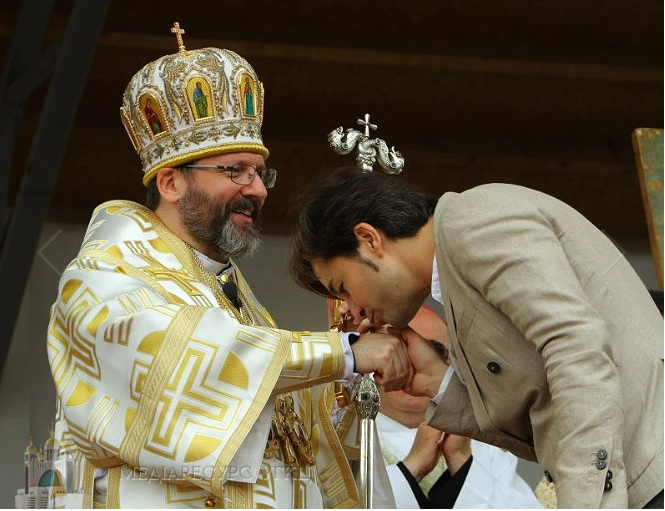
Ministry of Culture Yevhen Nyschuk is kissing the hand of the UGCC head in Zarvanitsa
Thus, the Uniates have been systematically promoting the idea of the unia for a long time. Their own Minister of Education (he has already done his job), their own Minister of Culture, their own director of the Department for Religious affairs. The administrative resource of the Uniates is amazing. The Orthodox, in a way, could learn such a persistent defense of one's position and the art of forming a political elite so that one day it won’t be written in the history books: once Ukraine was an Orthodox country ...
0
0
If you notice an error, select the required text and press Ctrl+Enter or Submit an error to report it to the editors.
Read also

What does the government want from Metropolitan Arseniy?
22 February 00:31

A word as a crime: What the court found Metropolitan Theodosiy guilty of
16 February 14:24

Exarchate of Constantinople for the UOC: a solution or a trap?
12 February 14:34

Why persecutors of the Church sooner or later end up in the dock
11 February 20:14






